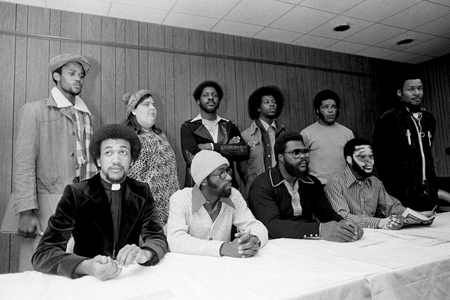In March 2011, the National Newspaper Publishers Association (NNPA), at the urging of Wilmington Journal Publisher Mary Alice Thatch, voted to pursue pardons of innocence for the Wilmington Ten. That effort got underway in earnest a year ago. After a series of NNPA stories based on an investigation that revealed never-before-seen court records proving prosecutorial corruption, the mainstream media, including the New York Times, caught on, and began editorially pushing for pardoning the Wilmington Ten. In addition, Change.org, the NAACP and the Wilmington Ten garnered over 144,000 petition signatures for the cause.
Gov. Perdue’s pardons legally mean that the accused did not commit the crimes for which they were convicted. The governor’s decision was roundly praised.
“Gov. Perdue’s historic action today doesn’t remove the past forty years of injustice against ten innocent American citizens – North Carolinians who stood up for equal treatment under the law in our public education system,” the Wilmington Ten Pardons of Innocence Project, a justice outreach effort of the National Newspaper Publishers Association and the Wilmington Journal newspaper, said in a statement.
“But [the governor’s pardon] does correct the historical record, that Connie Tindall, Jerry Jacobs, William Joe Wright, Anne Sheppard, Wayne Moore, Marvin Patrick, James McKoy, Willie Earl Vereen, Reginald Epps and the Rev. Dr. Benjamin Chavis, were indeed innocent of all charges falsely assessed to them by a corrupt prosecutor who, to this day, has not answered for what he did.”
Gov. Perdue agreed that revelations of the racist and illegal trial tactics of Wilmington Ten prosecutor Jay Stroud – which included documented handwritten evidence of seeking “KKK” and “Uncle Tom-type” jurors; bribing witnesses to commit perjury; hiding exculpatory evidence of a witness’s mental illness from the defense; and deliberately forcing a mistrial so that he could get both the judge and jury that would favor convictions – corrupt the criminal justice system, and shamed the state.
Perdue called it “naked racism.”
She said in a statement: “This conduct is disgraceful. It is utterly incompatible with basic notions of fairness, and with every ideal that North Carolina holds dear. The legitimacy of our criminal justice system hinges on it operating in a fair and equitable manner, with justice being dispensed based on innocence or guilt – not based on race or other forms of prejudice.”
She continued, “That did not happen here. Instead, these convictions were tainted by naked racism and represent an ugly stain on North Carolina’s criminal justice system that cannot be allowed to stand any longer.”
Chavis told the Wilmington Journal, “This is a great day for the people, and the movement. This is a very rare victory.”
Civil rights leader Rev. Al Sharpton agreed.
“It was a significant victory and all of you should be commended,” said Sharpton, who pushed the pardon effort on his radio programs.
North Carolina NAACP President Rev. William Barber, who partnered with the Wilmington Ten Pardons of Innocence, placed the successful pardons campaign in a historical context.
“Not only will the civil rights and human rights communities honor this act, but history itself will record this day as groundbreaking,” Barber told reporters in Raleigh, N.C. on Monday. “On the eve of the 150th anniversary of the Emancipation Proclamation, Gov. Perdue has proclaimed a contemporary emancipation for these freedom fighters. These pardons are not only for North Carolina but also for the nation and for the world. We honor the governor’s noble, courageous and righteous decision today and we commend her heart’s steadfast commitment to justice.”
Special to the NNPA from The Wilmington Journal

